- Home
- Upton Sinclair
The Coal War Page 5
The Coal War Read online
Page 5
Before matters had got that far, however, Jessie came in; having been hovering outside the library in terror, ever since the discussion began. She put her arms around her father, and wet his white side-whiskers with her tears, ending the argument by sheer force of emotion. The old gentleman had never denied her anything in her life-time, so he could hardly let luncheon get cold while he debated Socialism with her lover. And after luncheon, she played the piano for him, and laughed and chatted all the time. Hal did his part—but it was like playing the piano and chatting on the slopes of Mount Vesuvius!
[15]
From this adventure Hal went for a call upon Adelaide Wyatt and the revolutionary parlor-maid. Already the miracle he had foretold had happened to Mary Burke. She had taken her mistress’s hints, with a result that her fingernails were clean, her treasure of auburn hair shone dazzlingly under a white lace cap; she was the very picture of a parlor-maid! Her clean, straight figure had filled out in this new home, and her cheeks had again that vivid Irish color which had struck Hal when he had first encountered her, a rose in a mining-camp, taking in the family wash!
Mary was watching things about her, he could see. Yet she was sensible about it, free from self-consciousness; she would learn what a lady might have to teach, but without losing her head, or forgetting her people at home. Her steady grey eyes met Hal’s with the old frankness. Apparently it was not an impossible thing for one to be a servant with dignity.
Mary was happy; for the first time since Hal had known her the burden of care was lifted from her life. Her brother and sister were living with Mrs. David, who was good to them; Tommie’s wages as a “trapper-boy” sufficed for his keep, and Mary was sending three dollars a week for Jennie. As for Old Patrick, he was living in the cabin alone, and his drinking harmed no one but himself. Mary had long ago been forced to give him up, so the pain of this did not cut too deeply into her soul.
Yes, Mary was happy! That sense of fun which is never very deep below the surface of an Irish mind bubbled over when Hal told about Little Jerry’s adventures at the New Year’s party, and about his own adventures with the chancellor of Peter Harrigan’s College. He told about the “social study” nights, and all the interesting things that went on there. As he talked, the thought came to him, How Mary would have liked to go to one of those “social study” nights! And how he would have liked to take her! But he could not take her, he could not even tell his friends about her. He had to keep her a dark secret—more so now than when she had been in North Valley. For a college boy to be interested in a rose in a mining-camp might conceivably be a romance; but for him to be interested in a parlor-maid could not possibly be anything but a scandal!
Hal ought to have been satisfied, as Mary was, now that she had a good home; but instead he was thinking about this dirty world which drove people to cringing and cowardice, when they had nothing of the kind in their nature. Mary was as fine and straight a girl as you would meet in a life-time; but nevertheless, there would be a line drawn, and Mary would be on the other side of that line. And this canting world would go on calling itself a democracy, a land of equal opportunity!
Poor Mary! She was so happy in her wonderful new role—so charming with her Irish fun! But let her not make the mistake of thinking that she had really been taken into this world of cleanness and ease! Let her not get the idea that she was dusting Mrs. Wyatt’s bric-a-brac out of love and gratitude! Mrs. Wyatt herself would be as human as she dared, but the ladies who came to her tea-parties would be quick to put a revolutionary parlor-maid in her “place”! Hal was wondering how long it would be before something happened to break “Red Mary’s” bubble of happiness. Suppose it was to occur to her in this new and wonderful prosperity to ask her friend “Joe Smith” to take her to a picture-show!
Just now, however, Mary did not need picture-shows. She was revelling in a more wonderful world to which she had secured admission—her mistress’s library. Hal had told her what to read, and she had been sitting up half the night to finish “Comrade Yetta”. He was interested to see the effect upon her of this story of a Socialist working-girl. She told him about it with a thrill in her voice. “Joe, I never knew there were such things, so many movements, so many people helpin’ to set free the workin’-class!”
She saw now what he had meant, when he urged her to get an education. She had thought she knew enough—what did a body need to know, save that the poor were being devoured, and must stand together and put an end to it? But now she was realizing how complicated was the problem; there were many evils, many remedies offered, many courses to choose among. Hal had sent her Socialist papers, and she had read every line of them, and had got her head in, a whirl! “Ye read what one man says and think he’s got it right, and then ye read another man, and he sounds good too—only he says the other man’s all wrong! I read about strikes in South Africa and New Zealand, places I never heard of, so I have to get the geography-book. And there are so many long words—why do they have to have such long words, Joe? Even Mrs. Wyatt don’t always know what they mean!”
Adelaide put in with a laugh that she was educating herself, as well as Mary. They would be a team of revolutionists when they got through!
So Hal went away with a pleasant image of Mary. What a wonderful thing it was to see a mind unfolding, reaching out for new opportunities, discovering the world of ideas! Inevitably this brought another thought—why could not his sweetheart take hold of things like that? She really knew little more than Mary; she had the smattering of history and “polite letters” that young ladies obtain in boarding-schools, but of the great vital ideas of the day she was utterly ignorant. And when he offered her knowledge, why did she not take it?
He did not want to compare Jessie with Mary. It seemed disloyal, and he put the two in separate compartments of his mind, and strove to keep them there. But somehow they seemed always to come together! It was not their fault; for Mary never mentioned Jessie’s name, and as for Jessie, she was not supposed to know about the revolutionary parlor-maid. But Hal had chanced to mention Adelaide Wyatt to Jessie, and he had noted a sudden silence, and a shadow on Jessie’s fair brow. Could it be that she had heard the rumor? And if so, what was she thinking? Hal was not naturally alert to the subtleties of women’s minds, but Adelaide had warned him here, and so, as he walked along, he had new quarrels with the world of caste and gossip!
[16]
Hal’s next call was upon the Minettis. He learned that Big Jerry had come home, and got his head well, and gone off to resume his dangerous work. He had grown a mustache and beard for a disguise; and, how funny he looked! cried Little Jerry. They had just had a letter from him, smuggled out from the Western-American, where he was at work again. “I told you he fool them bosses!” proclaimed the youngster.
Mr. Wilmerding had called, said Rosa. He seemed to be a good man, in spite of the fact that he preached in Peter Harrigan’s church. He had begged to have Little Jerry in his Sunday-school, so that the child might know the name of Jesus as something else than a “cuss-word”. Rosa was not sure what Big Jerry would say, but she had let the child go, and he had been given a nice picture-book; also a lady had called on them, bringing good things to eat, and a spinning top, and a rattle for the baby. Rosa, who was a Socialist like her husband, and a shrewd little body for all her child’s face, remarked that perhaps Mr. Wilmerding wanted to make his conscience feel better, by getting some poor people into his fine church!
During this visit to Western City Hal went also to see Jim Moylan, the secretary of the district organization of the miners, who had just got back from a trip to the “field”. There had been a sudden flare-up of revolt at Harvey’s Run, and it had spread to Pine Creek and Bonito, in spite of Moylan’s best efforts. He had called Harmon, his chief, to his aid, but a number of the men were still refusing to go back to work. They were cursing the union officials up and down the line, calling them cowards and weaklings, some going so far as to call them traitors. They, the men, were on
strike, and others wanted to join them; who was paying the leaders to hold them back? Such was the situation in the coal-country, at the time that everybody in Hal’s world believed that the labor leaders were trying to stir up trouble.
Hal met John Harmon, the executive of the United Mine Workers in charge of the district; a man who had gone to work in the coal-pits at the age of eight, educated himself at night, and risen to this position of leadership. Hal found it thrilling to talk with him; as if a private who had been fighting in the trenches were suddenly taken to staff-headquarters and allowed to see a map of the battle. Such stories as he had to tell, not merely of open fighting, but of secret sapping and mining! There was a powerful strikebreaking concern, the Schultz Detective Agency, which had fought the miners’ union in many a field; they were sending in scores of “spotters”, and bribing and buying right and left. Only a short time before this, one of the prominent men in Harmon’s office—he would prefer not to say who—had been invited to a conference with a well-known politician, and found himself in an automobile with no less a person than the great Schultz himself. The detective had something to propose; he was diplomatic and cautious—but properly led on, he disclosed the fact that he desired to pay the union official a hundred and fifty dollars a month for selling out his organization. And when the official showed reluctance to close with the offer, the other intimated that if necessary the sum might be increased.
[17]
In other places than union headquarters there were signs that Peter Harrigan and his associates were preparing for trouble. There was, for example, their effort to cripple the Western City “Gazette”, which, with its thirty thousand working-class readers, made it impossible for coal-camp rebellions to be suppressed in secret. The other papers of the city were already combined against the “Gazette” to the extent of black-listing dealers who sold it; the paper had to be delivered by carrier, or sold by enterprising boys. And now suddenly came a mysterious eruption of rowdies, who attacked these carriers and boys, beating them and scattering their papers in the mud. For some reason the police were blind to this eruption, and powerless to find the rowdies when called upon. Likewise the other newspapers maintained dead silence.
This occurred just before Hal’s commencement. Happening to be in the city he went to see his friend Billy Keating, and heard the details. “For heaven’s sake,” he cried, “why don’t you get some rowdies of your own?”
Billy answered, with a laugh, “We did, but the police saw them!”
“And what are you doing now?”
“We’re printing the news. When you’re printing the news, the people will get your paper, even if they have to walk to the office for it.”
To one who had been down in the coal-country, and realized how vital to the miners’ cause was the little publicity the “Gazette” could give, this situation was intolerable. Hal got hold of Lipinsky and two other members of the “Social Study Club”, who constituted themselves a committee to get legal evidence for the “Gazette”. Needless to say, the “Gazette” did not fail to “play up” this support of its cause by “prominent young collegians”. And so Hal got himself into the hottest tub of hot water yet!
In this far western country men were still close to the frontier days; when they fought, they fought fiercely, and were not squeamish about the weapons they used. In Western City the “interests” maintained an underground scandal-sheet for the purpose of intimidating those who might threaten them; “Simple Simon” was the name of the mysterious organ, and all “society” somehow got hold of it, and rejoiced when it enabled them to believe the worst about those who attacked their privileges. In the issue of this paper following the raids upon the “Gazette”, there appeared a paragraph to the effect that a certain youth of too much wealth had become active as a labor agitator; his family, who were distressed about his behavior, might possibly find the source of his extreme ideas if they would inquire as to the visits he paid to a mining-camp damsel in the home of a sprightly member of the “smart set”, soon to be a grass-widow, if reports were to be believed.
Hal went wild, and set out forthwith on a hunt for the editor of “Simple Simon”. But the editor was not an easy person to find—he had many people hunting him, week by week! Having failed to discover anyone more to the point than an office-boy and a janitor, Hal went to interview his cousin, Appleton Harding, a rising young lawyer of Western City. “Appie” pointed out the obvious fact that all Hal could accomplish by proceedings for criminal libel was to give the story wider circulation. But Hal was not to be restrained, he would not quit till he had that editor either in jail or in hospital! He went off, threatening to consult another lawyer; and so “Appie” made haste to warn Brother Edward, who had to threaten to take the matter to their father.
And even this lesson was not enough; the youth of too much wealth would not give up being a fanatic, and trying to overthrow the foundations of society! There was another conference, this time between Edward Warner and Garret Arthur, the “bond-worm”, and a plan was worked out for the salvation of the young fanatic’s future. But it was cautiously agreed by the conspirators that they would not let the young fanatic know the origin of the plan. Garret Arthur could realize that it was no job for a “bond-worm”, to handle a youth gone mad on socialistic moonshine. If they hoped to save him, they must be wise as serpents and harmless as—well, as a girl with star-dust in her hair, and eyes wide-open, questioning, full of wonder!
The day after the conference Hal received a note on beautiful stationery, in one of those tall hands whereby young ladies of fashion demonstrate their indifference to the cost of ink and paper, asking him if he could not come to see her at once about a matter of importance. When he came, he did not find Jessie wrought up about hideous insinuations in scandal-sheets; no, for if young ladies of fashion know of the existence of scandal-sheets, or even of scandals, they do not mention it to their brothers and sweethearts. Jessie was lovely as ever, and radiant with happiness, because she had just heard the most heavenly news—her mother was going to take her abroad in a couple of weeks, to stay for a long, long time; and, wonder of wonders, she invited Hal to accompany them!
Hal could easily perceive what was back of this project. But he saw that Jessie’s heart was set upon it, so he contented himself with replying that he would have to take time to think about so vital a change in his plans. What were his plans, Jessie asked; and when he answered, he saw tears of distress come into her eyes. Hal had been meaning to spend the summer investigating conditions in the mining properties of the Warner Company!
[18]
When Hal thought the matter over he found himself inclining to give way to his relatives. There were movements in Europe which a young revolutionist might well afford to know about. There were men who had been grappling for generations with problems to which America was just awakening; and to meet these men face to face would be a wonderful experience. Also, Hal told himself, he would be giving Jessie a chance—he could devote more time to her, he could take her about and try to make her understand what he was doing. On the other hand it was clear that if he declined the invitation there would be real trouble with the Arthur family. Mount Vesuvius had been in eruption again, and Jessie lived in an atmosphere of sulphur and brimstone. Possibly that was why her eyes were full of tears, Hal suggested. But it was no joking matter; her father had actually proposed that she should drop Hal from her life. On that occasion the old gentleman had made the alarming discovery that his favorite daughter was subject to attacks of hysterics; so now he was as much afraid of his daughter as of Socialism!
In their concern, the family even called in Hal’s father, whom it was strictly forbidden to trouble with cares. Sitting on the porch of their home one sunshiny afternoon, Edward Warner Senior brought up the subject of his son’s unfortunate attitude to life. In his pitiful childish voice he pointed out what a serious thing it was to their business to have the hostility of Peter Harrigan. There were certain courtesies one owed in
the world of affairs; and while it was certainly true that working-people ought to be kindly treated, one must remember that they were foreigners, ignorant and excitable, and that it was very wrong to stir them up to disobedience.
Hal was careful and gentle in his reply. He gave a few details about the evils he was opposing. Yes, the old gentleman admitted that American business-men worked their employes too hard; they worked themselves too hard, they lost the enjoyment of life. Also, there was no doubt that Peter Harrigan was a harsh man; a good man in his own peculiar way, generous if you came to him right, and useful in the church—but thinking a great deal of his worldly power, and driving his business machine at a cruel pace.
Hal knew that in the days before his father’s illness he would not have had such an easy time in a discussion. Edward Warner Senior had himself been a business-man, and had driven his machine at the usual American pace. But in one dreadful night he had been turned into a feeble old man; his hair was white, and the very gentleness of his smile wrung your heart. He was getting stout, because he sat about all day, or was driven in his car. His ideas had a tendency to wander, and he craved to be entertained.
More than anything else in the world he craved the companionship of his favorite son. His delight in life was to have Hal and Jessie play tennis with Laurence Arthur and his fiancée; the old gentleman would come to the court and sit, watching every stroke, keeping up a constant run of comment, applauding gleefully the good shots—especially if they were Hal’s. There was one business-man in the family, Edward Junior, and the old gentleman’s idea was that Hal should be its ornament, its holiday part. Hal was so designed by Nature, with the grace and the charm; but instead of filling his proper role, he went off and bound himself in a treadmill of killing toil! He cast away and trampled upon the heritage his father had won for him, he put himself before the world as a living indictment of his father’s life-work; and to keep him from such madness there was no way save to ship him off to Europe, five thousand miles away from a lonely old invalid!

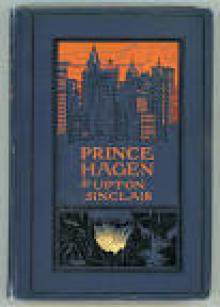 Prince Hagen
Prince Hagen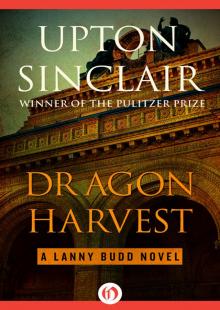 Dragon Harvest
Dragon Harvest The Jungle
The Jungle Sylvia's Marriage
Sylvia's Marriage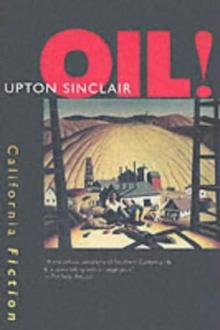 Oil! A Novel by Upton Sinclair
Oil! A Novel by Upton Sinclair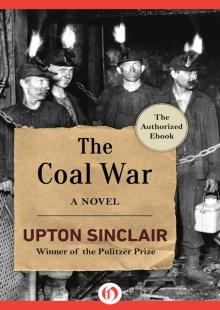 The Coal War: A Novel
The Coal War: A Novel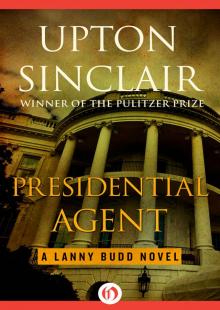 Presidential Agent
Presidential Agent World's End
World's End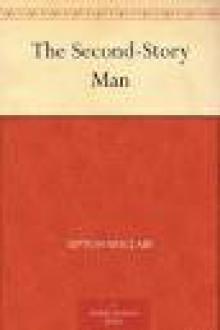 The Second-Story Man
The Second-Story Man O Shepherd, Speak!
O Shepherd, Speak!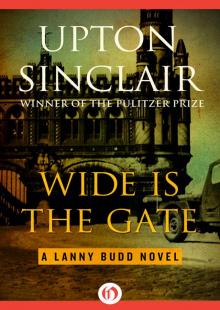 Wide Is the Gate
Wide Is the Gate The Return of Lanny Budd
The Return of Lanny Budd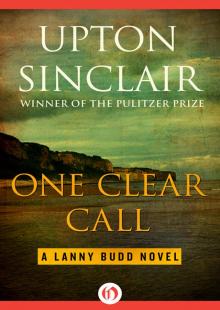 One Clear Call I
One Clear Call I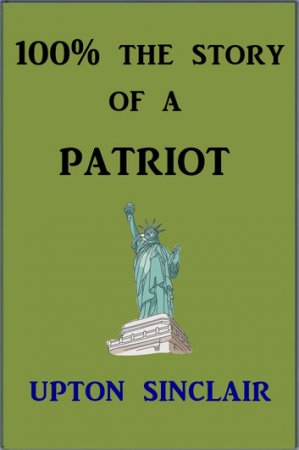 100%: the Story of a Patriot
100%: the Story of a Patriot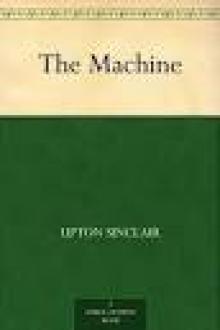 The Machine
The Machine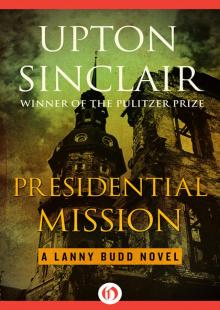 Presidential Mission
Presidential Mission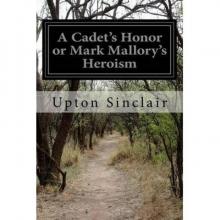 A Cadet's Honor: Mark Mallory's Heroism
A Cadet's Honor: Mark Mallory's Heroism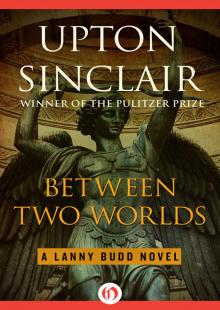 Between Two Worlds
Between Two Worlds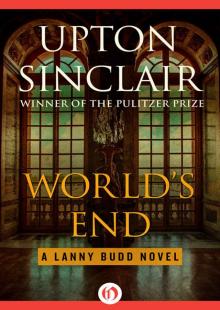 World's End (The Lanny Budd Novels)
World's End (The Lanny Budd Novels)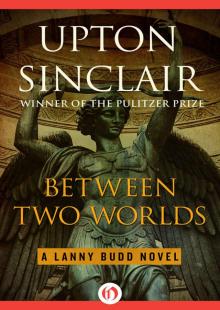 Between Two Worlds (The Lanny Budd Novels)
Between Two Worlds (The Lanny Budd Novels)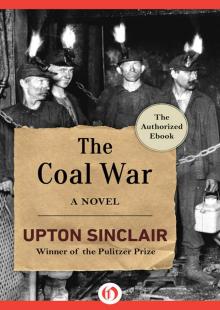 The Coal War
The Coal War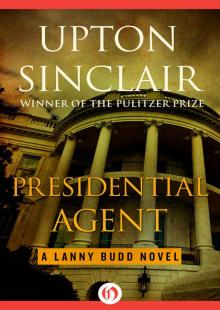 Presidential Agent (The Lanny Budd Novels)
Presidential Agent (The Lanny Budd Novels)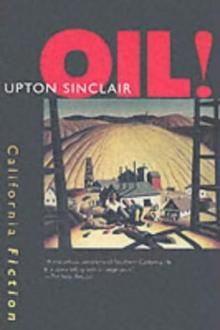 Oil (filmed as There Will Be Blood)
Oil (filmed as There Will Be Blood)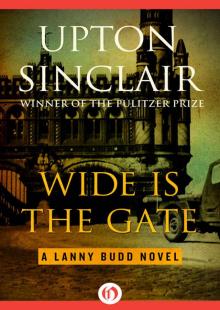 Wide Is the Gate (The Lanny Budd Novels)
Wide Is the Gate (The Lanny Budd Novels)